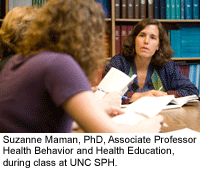Related Posts
var a2a_config = a2a_config || {};
a2a_config.linkname = "Stop bashing faculty and universities!";
a2a_config.linkurl = "http://mondaymorning.web.unc.edu/2011/08/02/stop-bashing-faculty-and-universities/";
Enough is enough!
I am fed up with anti-university and anti-government sentiments driving state houses across the U.S. At the recent schools of public health deans’ meeting, deans from several states talked about the amount of time they now spend documenting faculty productivity, because their states have mandated new data collection. (Isn’t it ironic that people who think we are not productive enough require new data collection that detracts from our primary missions?) Underlying new demands is the assumption that if faculty just taught more, we could hire fewer of them, and we’d have a more productive workforce. This is overly simplistic and ignores complexity of faculty roles and benefits of their research.
 Faculty members are working harder than ever. Most productivity formulae fail to take into account many faculty activities. Here are a few reasons.
Faculty members are working harder than ever. Most productivity formulae fail to take into account many faculty activities. Here are a few reasons.
- Some faculty members teach several courses a year; others may teach a couple courses a year. The ones who teach fewer courses generally are those who bring in more research dollars. (More later.) Classes are larger than in past which means more work for faculty.
- For every hour of class, a faculty member may spend 5-10 hours preparing, even more if it is a new class. After several years of budget cuts, he/she no longer has teaching assistants to help.
- Today’s students expect faculty members to be pretty much 24/7. They’re answering students’ emails at all hours of the day and night as well as weekends. They’re grading more exams and papers and meeting with students more than before. Today’s students want more, and we are prepared to give it.
- We have few support staff in departments so faculty members now do work on course materials, presentations and manuscripts that assistants once did.
- Faculty members serve on committees for their departments, school and university as well as state and federal agencies and NGOs. With fewer staff in these organizations, a lot of work gets done this way.
- Because we are a public university with a strong commitment to our state, our faculty members provide thousands of service hours to North Carolina every year.
The world needs our faculty members’ research. It makes no sense to call for faculty to stop doing research so they can return to the classroom. Here are a few reasons.
- The fact that our faculty members are expected to raise 50% or more of their salaries from grants means that they cover more than 60% of faculty members’ salaries in our School. People in North Carolina benefit by not having to pay full salaries for many of our tenured and tenure track faculty members. We’re a bargain!
- Indirect cost recovery from grants pays for a lot of essential infrastructure in universities. Our faculty members raise more than $10 million each year that goes to the university for this purpose.
- Through research, we have solved/helped to solve many problems that affect North Carolinians and people elsewhere. And we’re working on solutions for many other problems. Some examples (but there are hundreds more):
Health Behavior and Health Education Professors Vangie Foshee, Susan Ennett and their colleagues developed Safe Dates, a program that effectively reduces dating violence among teens. It now is being disseminated across the U.S.
- Nutrition Professors Alice Ammerman, Marci Campbell and their colleagues have been working for many years in very poor areas of N.C. Not only have they improved people’s diets; they also created a business, called Threads of Hope, which provides jobs and empowers local women. (More and more, people in public health understand that the economy and health are intertwined.) Another Nutrition Professor, Dianne Ward, developed NAP SACC to prevent obesity among children by insuring that children in preschools eat healthier foods and are more active. The program now is being used across North Carolina and was cited by Michele Obama as the kind of program that should be used nationwide.
Kenan Distinguished Professor Mark Sobsey and colleagues in Environmental Sciences and Engineering developed a ceramic water filter that reduces users’ exposure to pathogens that cause intestinal diseases. These filters are great for the developing world; but the U.S. needs them after floods.
- Humana Professor of Health Policy and Health Management George Pink helps rural hospitals remain solvent. Without George’s work, there would be fewer hospitals in rural communities.
Epidemiology Professor Steve Meshnick partnered with a N.C. company, InsectShield, to demonstrate that repellent-embedded clothing can reduce exposure to ticks, tick bites and tick-borne diseases. To test efficacy, they worked with state water quality employees who are exposed to ticks in the course of their jobs. Epidemiology Professor Ralph Baric is designing better vaccines for some of the world’s scariest diseases.
- Research pays many dividends. Across our School, every day, faculty members, staff and students are solving some of the world’s biggest challenges. Some of these lead to lives saved, others to faster clinical trials which can bring new medicines to people faster and others to dollars saved. They could not do this research without external funding.
Philanthropy won’t solve problems of under-supported universities. I am deeply grateful to our donors, many of whom have stepped up in the last few years to support more students and provide more unrestricted funds to the School. But donors don’t want to cover universities’ operating costs; they want to support scholarships, professorships, new ideas and programs and other areas. We are so appreciative of donors, but they should not be expected to support the everyday expenses of our nation’s universities.
Praise for our staff and government employees
 Above, I wrote about our faculty, but our staff members are amazing people who have devoted themselves to the School, University and state. Over the last three years, they have had no raises. Because of their already too-low salaries, they are falling further behind by the year. They’ve been gracious beyond belief in dealing with increased workloads and thinner paychecks.
Above, I wrote about our faculty, but our staff members are amazing people who have devoted themselves to the School, University and state. Over the last three years, they have had no raises. Because of their already too-low salaries, they are falling further behind by the year. They’ve been gracious beyond belief in dealing with increased workloads and thinner paychecks.
I worked for the National Institutes of Health for five years. The people there are among the most devoted, hardest working people anywhere. I remember our security guard saying to me once: “Almost every government holiday, your parking lot is filled with cars. These people don’t have to work today, but they’re here anyway. Wow!”
See one of my favorite blogs, “Not Running a Hospital”, July 30th. Paul Levy offers great stories about the amazing contributions of civil servants.
It’s fashionable to bash professors and government employees. Of course, there are low performing individuals in any organization, but I’ll put NIH and our School and University up against the best companies. When your son or daughter goes to college, I bet you’ll want a dedicated professor who will have time for them, like ours do. You want potholes fixed, medical research on rare and other diseases to find drugs for the people you love, safe bridges and tunnels, health care for people over age 65 and safe food. Government workers are doing that.
Happy Monday. Barbara
